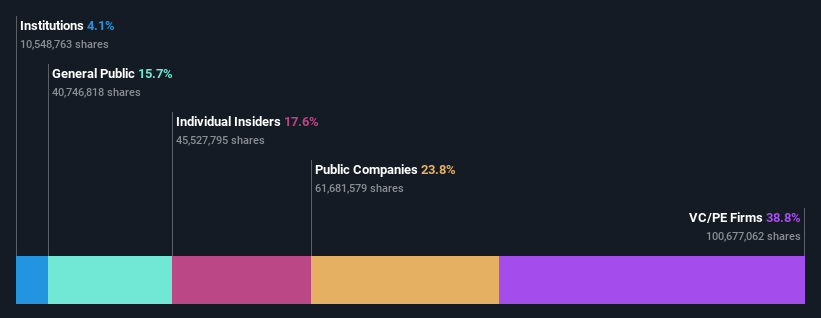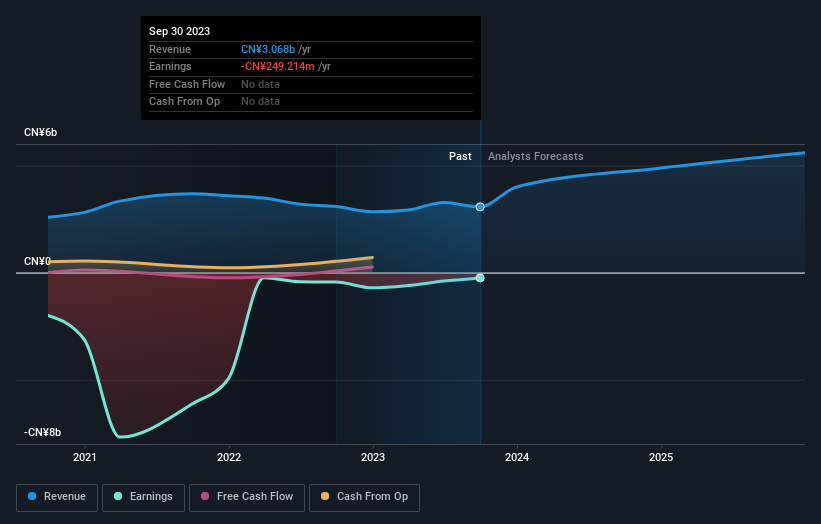Smart Share Global Limited's (NASDAQ:EM) market cap surged US$30m last week, private equity firms who have a lot riding on the company were rewarded
Key Insights
Smart Share Global's significant private equity firms ownership suggests that the key decisions are influenced by shareholders from the larger public
52% of the business is held by the top 5 shareholders
A look at the shareholders of Smart Share Global Limited (NASDAQ:EM) can tell us which group is most powerful. And the group that holds the biggest piece of the pie are private equity firms with 39% ownership. Put another way, the group faces the maximum upside potential (or downside risk).
Clearly, private equity firms benefitted the most after the company's market cap rose by US$30m last week.
In the chart below, we zoom in on the different ownership groups of Smart Share Global.
View our latest analysis for Smart Share Global
What Does The Institutional Ownership Tell Us About Smart Share Global?
Institutions typically measure themselves against a benchmark when reporting to their own investors, so they often become more enthusiastic about a stock once it's included in a major index. We would expect most companies to have some institutions on the register, especially if they are growing.
Since institutions own only a small portion of Smart Share Global, many may not have spent much time considering the stock. But it's clear that some have; and they liked it enough to buy in. If the business gets stronger from here, we could see a situation where more institutions are keen to buy. It is not uncommon to see a big share price rise if multiple institutional investors are trying to buy into a stock at the same time. So check out the historic earnings trajectory, below, but keep in mind it's the future that counts most.
Hedge funds don't have many shares in Smart Share Global. Looking at our data, we can see that the largest shareholder is Alibaba Group Holding Limited with 15% of shares outstanding. For context, the second largest shareholder holds about 12% of the shares outstanding, followed by an ownership of 9.1% by the third-largest shareholder. Furthermore, CEO Mars Guangyuan Cai is the owner of 8.4% of the company's shares.
On looking further, we found that 52% of the shares are owned by the top 5 shareholders. In other words, these shareholders have a meaningful say in the decisions of the company.
Researching institutional ownership is a good way to gauge and filter a stock's expected performance. The same can be achieved by studying analyst sentiments. While there is some analyst coverage, the company is probably not widely covered. So it could gain more attention, down the track.
Insider Ownership Of Smart Share Global
The definition of an insider can differ slightly between different countries, but members of the board of directors always count. Management ultimately answers to the board. However, it is not uncommon for managers to be executive board members, especially if they are a founder or the CEO.
Most consider insider ownership a positive because it can indicate the board is well aligned with other shareholders. However, on some occasions too much power is concentrated within this group.
Our information suggests that insiders maintain a significant holding in Smart Share Global Limited. Insiders have a US$29m stake in this US$167m business. It is great to see insiders so invested in the business. It might be worth checking if those insiders have been buying recently.
General Public Ownership
With a 16% ownership, the general public, mostly comprising of individual investors, have some degree of sway over Smart Share Global. While this group can't necessarily call the shots, it can certainly have a real influence on how the company is run.
Private Equity Ownership
Private equity firms hold a 39% stake in Smart Share Global. This suggests they can be influential in key policy decisions. Sometimes we see private equity stick around for the long term, but generally speaking they have a shorter investment horizon and -- as the name suggests -- don't invest in public companies much. After some time they may look to sell and redeploy capital elsewhere.
Public Company Ownership
Public companies currently own 24% of Smart Share Global stock. This may be a strategic interest and the two companies may have related business interests. It could be that they have de-merged. This holding is probably worth investigating further.
Next Steps:
It's always worth thinking about the different groups who own shares in a company. But to understand Smart Share Global better, we need to consider many other factors. To that end, you should be aware of the 1 warning sign we've spotted with Smart Share Global .
If you are like me, you may want to think about whether this company will grow or shrink. Luckily, you can check this free report showing analyst forecasts for its future.
NB: Figures in this article are calculated using data from the last twelve months, which refer to the 12-month period ending on the last date of the month the financial statement is dated. This may not be consistent with full year annual report figures.
Have feedback on this article? Concerned about the content? Get in touch with us directly. Alternatively, email editorial-team (at) simplywallst.com.
This article by Simply Wall St is general in nature. We provide commentary based on historical data and analyst forecasts only using an unbiased methodology and our articles are not intended to be financial advice. It does not constitute a recommendation to buy or sell any stock, and does not take account of your objectives, or your financial situation. We aim to bring you long-term focused analysis driven by fundamental data. Note that our analysis may not factor in the latest price-sensitive company announcements or qualitative material. Simply Wall St has no position in any stocks mentioned.


